|
|
|
Sort Order |
|
|
|
Items / Page
|
|
|
|
|
|
|
| Srl | Item |
| 1 |
ID:
081561
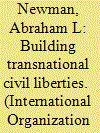

|
|
|
|
|
| Publication |
2008.
|
| Summary/Abstract |
Democratic nations have long struggled to set the proper balance between individual freedom and government control. The rise of digital communications networks, market integration, and international terrorism has transformed many national civil liberties issues into important international debates. The European Union was among the first jurisdictions to manage these new transnational civil liberties with the adoption of a data privacy directive in 1995. The directive substantially expanded privacy protection within Europe and had far-reaching consequences internationally. While international relations scholars have paid considerable attention to the global ramifications of these rules, research has not yet explained the origins of the European data privacy directive. Given the resistance from the European Commission, powerful member states, and industry to their introduction, the adoption of supranational rules presents a striking empirical puzzle. This article conducts a structured evaluation of conventional approaches to European integration-liberal intergovernmentalism and neofunctionalism-against the historical record and uncovers an alternative driver: transgovernmental actors. These transgovernmental actors are endowed with power resources-expertise, delegated political authority, and network ties-that they employ to promote their regional policy goals. This article uses the historical narrative of the data privacy directive to explain the origins of a critical piece of international civil liberties legislation and to advance a theoretical discussion about the role of transgovernmental actors as policy entrepreneurs within the multilevel structure of the European Union
|
|
|
|
|
|
|
|
|
|
|
|
|
|
|
|
| 2 |
ID:
147084


|
|
|
|
|
| Summary/Abstract |
The cross-border movement of people, goods, and information frequently results in legal disputes that come under the jurisdiction of multiple states. The principle of deference—acceptance of another state's exercise of legal authority—is one mechanism to manage such jurisdictional conflicts. Despite the importance of deference in international law and cooperation, little is known about the causes of variation in its use. In this article, we develop a theory of deference that focuses on the role that domestic institutions and norms play in ensuring procedural and substantive fairness. We test this theory in an original data set concerning accession practices in the Hague Convention on International Child Abduction. Our findings offer considerable support for the idea that states evaluate partners on the likelihood that they can offer a fair legal process. Exploring empirically the efforts against parental child abduction, we offer a nuanced account of the link between domestic institutions and norms and international cooperation. This account suggests that greater attention should be paid to the use of deference as a mechanism to manage the conflicts posed by globalization.
|
|
|
|
|
|
|
|
|
|
|
|
|
|
|
|
| 3 |
ID:
173213
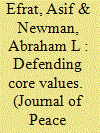

|
|
|
|
|
| Summary/Abstract |
Are states willing to overlook human rights violations to reap the fruits of international cooperation? Existing research suggests that this is often the case: security, diplomatic, or commercial gains may trump human rights abuse by partners. We argue, however, that criminal-justice cooperation might be obstructed when it undermines core values of individual freedoms and human rights, since the breach of these values exposes the cooperating state to domestic political resistance and backlash. To test our argument, we examine extradition: a critical tool for enforcing criminal laws across borders, but one that potentially threatens the rights of surrendered persons, who could face physical abuse, unfair trial, or excessive punishment by the foreign legal system. We find support for our theoretical expectation through statistical analysis of the surrender of fugitives within the European Union as well as surrenders to the United States: greater respect for human rights correlates with the surrender of fewer persons. A case study of Britain confirms that human rights concerns may affect the willingness to extradite. Our findings have important implications for debates on the relationship between human rights and foreign policy as well as the fight against transnational crime.
|
|
|
|
|
|
|
|
|
|
|
|
|
|
|
|
| 4 |
ID:
129992
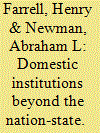

|
|
|
|
|
| Publication |
2014.
|
| Summary/Abstract |
What is the relationship between domestic and international politics in a world of economic interdependence? This article discusses and organizes an emerging body of scholarship, which the authors label the new interdependence approach, addressing how transnational interactions shape domestic institutions and global politics in a world of economic interdependence. This literature makes three important contributions. First, it examines how domestic institutions affect the ability of political actors to construct the rules and norms governing interdependent relations and thus present a source of asymmetric power. Second, it explores how interdependence alters domestic political institutions through processes of diffusion, transgovernmental coordination, and extraterritorial application and in turn how it changes the national institutions mediating internal debates on globalization. Third, it studies the shifting boundaries of political contestation through which substate actors affect decision making in foreign jurisdictions. Given the importance of institutional change to the new interdependence agenda, the authors suggest several instances where historical institutionalist tools might be exploited to address these transnational dynamics, in particular, mechanisms of cross-national sequencing and change strategies of substate actors. As globalization continues, it will be ever more difficult to examine national trajectories of institutional change in isolation from each other. Equally, it will be difficult to understand international institutions without paying attention to the ways in which they both transform and are transformed by domestic institutional politics. While the new interdependence approach does not yet cohere as a single voice, the authors believe that it offers an innovative agenda that holds tremendous promise for both comparative and international relations research as it calls on scholars to reconsider the dynamic nature of globalization for global politics.
|
|
|
|
|
|
|
|
|
|
|
|
|
|
|
|
| 5 |
ID:
181541
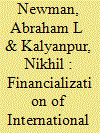

|
|
|
|
|
| Summary/Abstract |
We investigate how the international investment regime turned into an investment vehicle. Through the process called third-party funding, financiers back international legal claims by firms against countries and in turn seek a share of any potential award. More generally, we add to debates on how international regimes evolve and at times generate unanticipated consequences. Building off work on the sociology of fields, we argue that institutional change can occur when individuals from different fields interact. Each field has its own local practices and beliefs about how governance institutions like international regimes function. When professionals from one field analyze problems in another, they use the tools from their native field. If potential solutions provide material and status benefits for the dominant actors in the targeted regime, cross-field coalitions can form and change the targeted regime’s practice. As hedge funds in the finance field and lawyers in the international law field sought to reinvent themselves after the 2008 financial crisis, they teamed up to make Investor State Dispute Settlement a speculator’s game. Theoretically, we embed theories of regime change within larger social relations, highlighting the importance of informal interactions among regime operators for the use and function of governance institutions. We underscore the role of field interdependence as actors engage in contestation across social and political domains. Empirically, we demonstrate the way in which financialization has had far-reaching consequences that extend well beyond traditional economic sectors, reconfiguring the practice of international law.
|
|
|
|
|
|
|
|
|
|
|
|
|
|
|
|
| 6 |
ID:
110779
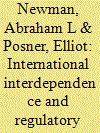

|
|
|
|
|
| Publication |
2011.
|
| Summary/Abstract |
This article revisits a fundamental question of international political economy: when does cross-border economic interdependence become a source of power. The view that economic interdependence is a source of potential power, not just mutual benefits, has a long lineage traceable to political realism, organizational economics, Ricardian trade theory, and structural Marxism, and researchers typically focus on preferred causal variables in isolation. Despite important contributions, little attention has been paid to understanding the interactions of multiple perspectives on asymmetric interdependence, or to making sense of contradictory expectations of the various models. As a consequence scholars engaged in globalization debates, such as those about policy convergence or private actor governance, frequently talk past one another. To deduce expectations about the relationship between power and interdependence, we build a model synthesizing standard approaches that analyze the effects of market size and market scope separately, and then add the critical variable of jurisdictional boundaries. By decoupling geography and authority, our analysis produces a respecification of classic interdependence models and advances core international political economy debates concerning power dynamics in a globalized economy.
|
|
|
|
|
|
|
|
|
|
|
|
|
|
|
|
| 7 |
ID:
178560
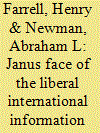

|
|
|
|
|
| Summary/Abstract |
Scholars and policymakers long believed that norms of global information openness and private-sector governance helped to sustain and promote liberalism. These norms are being increasingly contested within liberal democracies. In this article, we argue that a key source of debate over the Liberal International Information Order (LIIO), a sub-order of the Liberal International Order (LIO), is generated internally by “self-undermining feedback effects,” that is, mechanisms through which institutional arrangements undermine their own political conditions of survival over time. Empirically, we demonstrate how global governance of the Internet, transnational disinformation campaigns, and domestic information governance interact to sow the seeds of this contention. In particular, illiberal states converted norms of openness into a vector of attack, unsettling political bargains in liberal states concerning the LIIO. More generally, we set out a broader research agenda to show how the international relations discipline might better understand institutional change as well as the informational aspects of the current crisis in the LIO.
|
|
|
|
|
|
|
|
|
|
|
|
|
|
|
|
| 8 |
ID:
107534
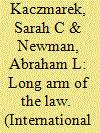

|
|
|
|
|
| Publication |
2011.
|
| Summary/Abstract |
Can the application of domestic law by bureaucracies in powerful states alter policy dynamics globally? Courts and regulatory agencies with jurisdiction over large markets routinely impose national rules to conduct transpiring outside of their physical borders. Such extraterritoriality has expanded to issues ranging from antitrust to the environment. Proponents claim that extraterritorial acts can have far-reaching international consequences, spilling over into the domestic political economy of regulation in target states. Skeptics, however, question the effects of these sanctions against internationally mobile actors. In this study, we offer the first quantitative analysis of extraterritorial intervention for global policy convergence. In particular, we construct an original time-series panel data set to test the association between extraterritorial actions by U.S. prosecutors and the national enforcement of foreign bribery regulations in target countries. Our empirical analysis finds strong statistical evidence linking extraterritoriality to national policy implementation, with jurisdictions that experienced a U.S. intervention being twenty times more likely to enforce their national rules. The findings suggest the important influence that domestic law in powerful states may have for global cooperation in general and sheds light on the key pillars of international anticorruption efforts in particular.
|
|
|
|
|
|
|
|
|
|
|
|
|
|
|
|
| 9 |
ID:
165157


|
|
|
|
|
| Summary/Abstract |
States with large markets routinely compete with one another to shield domestic regulatory policies from global pressure, export their rules to other jurisdictions, and provide their firms with competitive advantages. Most arguments about market power tend to operationalize the concept in economic terms. In this paper, we argue that a state's ability to leverage or block these adjustment pressures is not only conditioned by their relative economic position but also by the political institutions that govern their markets. Specifically, we expect that where a state chooses to draw jurisdictional boundaries over markets directly shapes its global influence. When a state expands its jurisdiction, harmonizing rules across otherwise distinct subnational or national markets, for example, it can curtail a rival's authority. We test the theory by assessing how changes in internal governance within the European Union altered firm behavior in response to US extraterritorial pressure. Empirically, we examine foreign firm delisting decisions from US stock markets after the adoption of the Sarbanes–Oxley accounting legislation. The act, which included an exogenous compliance shock, follows the harmonization of stock market governance across various European jurisdictions. Econometric analysis of firm-level data illustrates that EU-based companies, which benefited from jurisdictional expansion, were substantially more likely to leave the American market and avoid adjustment pressures. Our findings contribute to debates on the role of political institutions in economic statecraft and suggest the conditions under which future regulatory conflicts will arise between status quo and rising economic powers.
|
|
|
|
|
|
|
|
|
|
|
|
|
|
|
|
| 10 |
ID:
097723


|
|
|
|
|
| Publication |
2010.
|
| Summary/Abstract |
Cross-border cooperation among domestic regulators and public officials has become a defining feature of global governance. While a number of studies have tracked the emergence and institutionalization of such transgovernmental networks, less is known about their effect on domestic policy. This study explores this link for the important case of insider-trading regulation in original data for 116 countries between 1977 and 2006. It offers quantitative evidence that transgovernmental cooperation is related to domestic policy convergence but that the relationship is more complex than often assumed. Direct ties to powerful regulators increases a jurisdiction's likelihood of adopting internationally promoted policies such as insider-trading rules. Separately, membership in the International Organization of Securities Commissions (IOSCO), a forum designed to diffuse best practices among regulators, increases a jurisdiction's likelihood of subsequently enforcing newly adopted policies. The findings in this study suggest that different network components are associated with distinct aspects of domestic policy convergence. The results are directly relevant for current public policy debates about the reregulation of global financial markets as transgovernmental networks among domestic regulators have assumed a critical role.
|
|
|
|
|
|
|
|
|
|
|
|
|
|
|
|
|
|
|
|
|